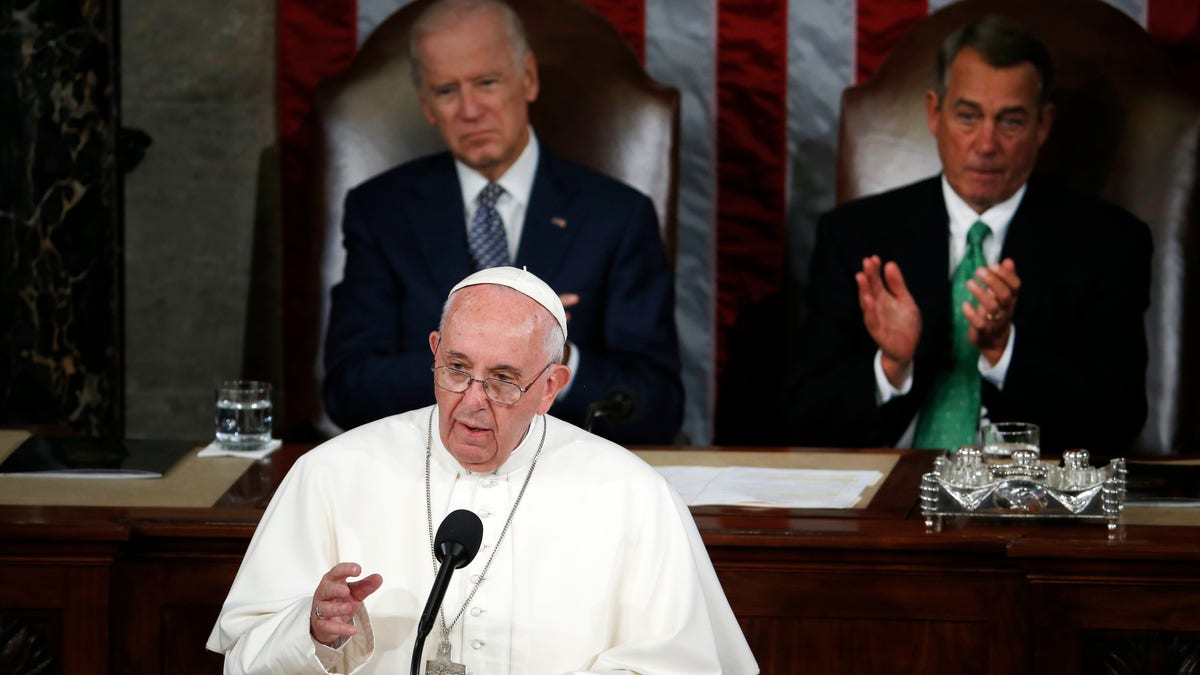
Pope Francis addresses a joint meeting of Congress on Capitol Hill in Washington, Thursday, Sept. 24, 2015, making history as the first pontiff to do so. Listening behind the pope are Vice President Joe Biden and House Speaker John Boehner of Ohio. (AP Photo/Carolyn Kaster)
Thursday, September 24 is an historic day. In the 1800s, prominent Americans warned of sinister papal plots to invade the Mississippi Valley. In the 1940s and 1950s, bestselling books lamented the threat that “Catholic Power” posed to “American Freedom.”
On Thursday, however, though, thousands of Americans -- Catholics and non-Catholics alike -- from parish youth-group members to the president of the United States -- are lining the streets to see and hear the Bishop of Rome, the first pope from the Americas.
Once upon a time, members of Congress gave speeches warning that Catholics were un-American; Thursday, Congress welcomed the pope to the Capitol, to address the entire nation.
The pope’s remarks were both humble and inspiring, both complimentary and challenging. Recalling the work, virtues, and “dreams” of four famous, but very different, Americans – Abraham Lincoln, Dorothy Day, Thomas Merton, and Martin Luther King – the Holy Father emphasized his crucial, basic point: “All political activity must serve and promote the good of the person and be based on respect for his or her dignity.”
A politician, of either party, who sees Pope Francis's visit as a photo-op to exploit at election-time, or who expects a pat on the back for her policy views, is doing it wrong.
This has been the pope’s consistent message (indeed, it is the heart of the Gospel): Every person matters -- the refugee, the convicted criminal, the vulnerable elderly, the person in poverty, the unborn child – every person.
To a political body that so often seems paralyzed by petty infighting and self-interest, the pope held up the Golden Rule. Do not “discard whatever proves troublesome,” he urged, but instead “treat others with the same passion and compassion with which we want to be treated.”
It is disappointing, but not surprising, that many commentators and politicians have seemed more interested in predicting which political "side" will gain an advantage from the pope’s visit and addresses than in actually hearing what he has to say. However, any American politician, of either party -- any American, for that matter -- who feels completely affirmed and vindicated by Pope Francis and his presentation of the Gospel is not paying attention.
A politician, of either party, who sees Pope Francis's visit as a photo-op to exploit at election-time, or who expects a pat on the back for her policy views, is doing it wrong.
Pope Francis is not interested in providing candidates and officials with a score card or a check list that they can use to compete with each other or to spin their own records as "Francis-approved."
In the pope’s public talks and appearances, he is not trying to somehow “balance” his calls for environmental stewardship and the abolition of capital punishment with his emphasis on religious freedom, marriage, and family. The point is not to give equal time or Twitter-fodder to “liberals” and “conservatives”; as he has said, these labels don’t interest him. His views, and the Church’s teachings, on these matters might seem inconsistent to American politicians but, in fact, they come from the same foundational conviction that we and our world are created and loved by God.
The pope’s visit and message are both prophetic and pastoral. His challenge to all of us is to allow ourselves to be challenged by Christianity. His hope is that discomfort will prompt dialogue and cooperation, and then conversion and change.







































